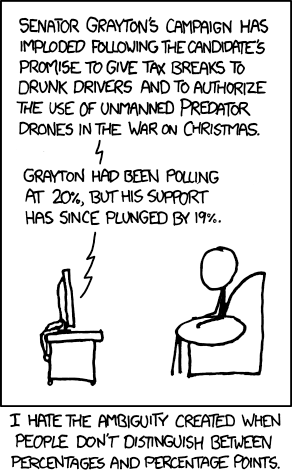huh, this feels pretty well established here in sweden: whenever people talk about stuff like elections it's consistently percentage points
Science Memes
Welcome to c/science_memes @ Mander.xyz!
A place for majestic STEMLORD peacocking, as well as memes about the realities of working in a lab.

Rules
- Don't throw mud. Behave like an intellectual and remember the human.
- Keep it rooted (on topic).
- No spam.
- Infographics welcome, get schooled.
This is a science community. We use the Dawkins definition of meme.
Research Committee
Other Mander Communities
Science and Research
Biology and Life Sciences
- !abiogenesis@mander.xyz
- !animal-behavior@mander.xyz
- !anthropology@mander.xyz
- !arachnology@mander.xyz
- !balconygardening@slrpnk.net
- !biodiversity@mander.xyz
- !biology@mander.xyz
- !biophysics@mander.xyz
- !botany@mander.xyz
- !ecology@mander.xyz
- !entomology@mander.xyz
- !fermentation@mander.xyz
- !herpetology@mander.xyz
- !houseplants@mander.xyz
- !medicine@mander.xyz
- !microscopy@mander.xyz
- !mycology@mander.xyz
- !nudibranchs@mander.xyz
- !nutrition@mander.xyz
- !palaeoecology@mander.xyz
- !palaeontology@mander.xyz
- !photosynthesis@mander.xyz
- !plantid@mander.xyz
- !plants@mander.xyz
- !reptiles and amphibians@mander.xyz
Physical Sciences
- !astronomy@mander.xyz
- !chemistry@mander.xyz
- !earthscience@mander.xyz
- !geography@mander.xyz
- !geospatial@mander.xyz
- !nuclear@mander.xyz
- !physics@mander.xyz
- !quantum-computing@mander.xyz
- !spectroscopy@mander.xyz
Humanities and Social Sciences
Practical and Applied Sciences
- !exercise-and sports-science@mander.xyz
- !gardening@mander.xyz
- !self sufficiency@mander.xyz
- !soilscience@slrpnk.net
- !terrariums@mander.xyz
- !timelapse@mander.xyz
Memes
Miscellaneous
Can't believe nobody has linked the relevant xkcd yet

We appreciate your service.
🫡
Having two possible outcomes does not mean it's a 50:50 chance.
"So if I aim the arrow at the 1cm square from 100m away and shoot, I either hit it or I don't. So basically I have a 50% chance of hitting it."
My wife, father-in-law and I were playing a board game with my brother-in-law. In this game, we were playing as detectives who have to try to find his character, but each turn he could move in secret in one of several directions. We were a few turns in at one point and he could have been in any of dozens of places at this point. We drove him nuts by saying "he's either in this spot or he's not, it's a 50-50 chance." He kept arguing "I could be in a ton of places! It's not a 50-50 chance!" But we just kept pretending we didn't understand and arguing that there were only two possibilities, he's there or he's not, so it was clearly a 50-50 chance. He got quite angry.
Scotland Yard or Letters from Whitechapel?
I love Scotland Yard. We got it for a friend who loves detective stories. Then discovered that it’s a public transit simulator which is even better.
Letters from Whitechapel?
Either that or you buried the lede by failing to mention something rather significant about the hidden character, and you were playing Fury of Dracula. Or my boardgamegeek-fu isn't as strong as I hoped.
Either I become president, or I don't.
Therefore, the odds of me becoming president is 50%
Brb committing 34 felonies.
You've already failed.
You have to commit hundreds of felonies. In broad daylight. And brag about it.
Threaten witnesses. Delay everything.
And only be convicted of 34.
Then not get sentenced.
Very weird fun fact about arrows/darts and statistics, theres 0% chance of hitting an exact bullseye. You can hit it its possible to throw a perfect bullseye. It just has a probability of zero when mathematically analyzed due to being an infinitesimally small point. Sound like I'm making shit up? Here's the sauce
How can an outcome both be entirely possible and have 0% probability?

Q.E.D
Key word here is "infinitesimally." Of course if you're calculating the odds of hitting something infinitesimally small you're going to get 0. That's just the nature of infinities. It is impossible to hit an infinitesimally small point, but that's not what a human considers to be a "perfect bullseye." There's no paradox here.
Another lesson I the importance of significant digits, a concept I've had to remind many a young (and sometimes an old) engineer about. An interesting idea along similar lines is that 2 + 2 can equal 5 for significantly large values of 2.
On the other hand: Half of my lottery tickets were jackpots. I never played and have (1/2 * 0 = ) 0 jackpots.
The thing with that is that it's actually a useful generalization to make in a lot of scenarios.
If you know nothing about the distinction between two possible outcomes, treating them as equally likely is a helpful tool to continue with the back of the envelope guess. Knowing this path needs 5 coin tosses to go right and this one needs 10 is helpful to approximate which is better.
Your example is obviously outside the realm where you have zero information, so uniform distribution is no longer the reasonable default. But the idea is from a reasonable technique, taken to extremes by someone who doesn't fully get it.
That's not even a stat question, it is a english question. It is an increase by 80% not to 80%
Statistics only come to play to figure out our new chances.
Maybe I'm wrong but by writing "increase by 80%" there is ambiguity you don't get if you instead spelled out:
- Increase by 80 percent
- Increase by 80 percentage points
Or "by 80 percentage points"
"By 80 percentage points" means add 80 more points to a number of percentage points, so 5% becomes 85%. "By 80 percent" means add 80 percent of the current value.
In game design, it has to be stated whether it’s multiplicative or additive. Sometimes a logarithmic function is used as well, with increases in efficiency as 1 / ( 1 + bonus ). This allows you to always add more bonus, but there’s diminishing returns.
i wish it was more common to also indicate the precedence of a percentage increase, so that it’s easier to know if i’m dealing with (x + y ) * z or x + (y * z). although that’s admittedly a lot harder to communicate.
When my son was about to be born my mother in law caught wind that we didn't plan on circumcising (before researching it I mostly felt it was just strange to do cosmetic surgery on a newborn) but her argument was mostly parroting the 50% reduction in this that and the other disease, missing the fact that it was going from a 0.5% chance to a 0.25% chance, but of course introduced new risks by nature of being a surgery.
Naturally after looking more into it I learned just how bonkers circumcision is so I was far more cemented in my position
it baffles me that anyone with a penis, or really anyone who knows what a penis actually is, would think it's a good idea
would people remove a child's eyelids? NO OF COURSE NOT holy shit
piercing flesh is generally to be avoided unless absolutely necessary, as is helpfully indicated to us by it being fucking painful
The fact that it is even allowed in so-called civilized countries is outrageous. In the US it common because some religious nut was obsessed with children's masturbation.
I play video games; I need to know if the percentage is additive or multiplicative.
"+100%" looks pretty good until you see what "×25%" actually gives you.
×25% gives you 1/4 the original value, whereas +100% is double the original value, let's say 8/4 to keep it consistent. ×125% (in case a 1 is missing) is still only 5/4 the original value.
Is there a typo in your comment?
In video games they commonly use that to mean they are multiplying by 25. We know it's not correct in stats. This is why game wikis commonly put the actual formula for things rather than the tooltip the developers wrote.
Biggest lie in a game's tooltip/description of an item was how the formula for Armor Piercing rounds in Fallout 1 and 2 was bad, so instead of being stronger than regular rounds, they were weaker.
Funny thing is this is a language issue, not a math issue.
Why not both?
I've always thought of math as a language and I talk to my kids about it that way too. Math is an other way to describe the world.
It's very different from spoken languages and translating between the two needs to be learned and practiced.
Our math education doesn't include enough word problems and it should be bi-directional. In addition to teaching students how to write equations based of sentences we should teach them how to describe what's going on in an equation.
It's really pretty simple - if something increases by 80%, you add 80% of whatever it already is... one dollar becomes $1.80... one percent becomes 1.8 percent.
Most people don't understand it because they've seen it done wrong so often, the wrong way seems right.
I'm quite willing to bet that 70% of the population has no clue that percentages, fractions, and decimals are the same thing.
I work in a place full of statisticians, and we've had to unfortunately have numerous conversations with some of them about the difference between "a decrease" and "a decrease in the rate." Apparently "it's increasing slower" isn't clear enough for some.
I've always wondered how to disambiguate multiplication and addition of percentages. I guess that's what percentage points are for?
10% of your people vote for a party.
The votes increase by 10% => now 11%
The votes increase by 200% => now 30%
The votes increased by 50 percent points => now 60%
The annoying part is that there is no well-known notation for showing percentage points, so people use % for both percentages and percentage points.
Difference between increase of x% (old percentage + old percentage * x%)% and increase of x percentage points (old percentage and x)%
well it's ambiguous. Its also a sloppy way of expressing an increase by 80 percentage points.
Wrong: I had a 1% chance, and I doubled my chances. Now my chances are 101%.
Right: I had a 1% chance, and I doubled my chances. Now my chances are 2%.
Wrighongt: I had a 1% chance, and I doubled my chances. Now my chances are 3%, because I'm a lucky person.
So you're telling me there's a chance?
People got this wrong about inflation as well. In 2020 there was actual deflation, and in 2021 there was very minimal inflation, meaning prices were still largely lower or similar as 2019. Then we saw 9% inflation in 2022. Total inflation in 2024 vs the 2019 benchmark was around 15%. Or 3% average per year, which is barely over the baseline. People just hear 9% inflation, completely missing the fact that this was a YoY number relative to the Trump recession.
And then there was that bogus article that said Argentina had lowered it's inflation to 2% and you find out in the article that's monthly inflation and the yearly figure was like 190%.
That's why when presenting numbers at work, we always distinguish a movement of X % (percent) from a movement of X ppts (percentage points)
Dark Souls cleared this up for me real quick.
